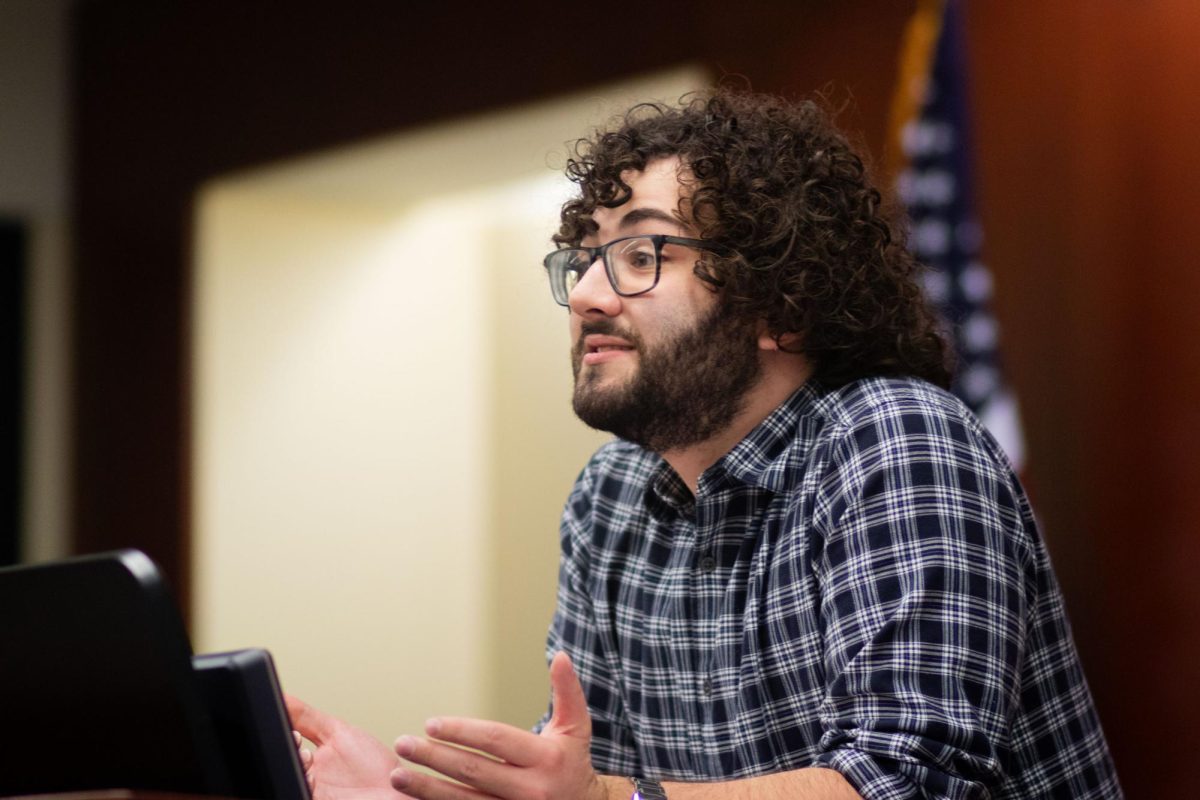Updated: Sept. 19, 2024, at 1:17 p.m.
Student Bar Association senators voted Monday to send a resolution to the body’s supreme court which, if passed, would grant expanded powers to the SBA executive vice president during senate meetings.
The Resolution for Senate Rules Reform, proposed by SBA Sen. John DeMarco, would grant the SBA vice president the power to extend discussion periods during SBA Senate meetings, adjust meeting agendas to address “time sensitive matters,” temporarily alter senate procedure in “unusual circumstances” and remove members from senate meetings to maintain “meeting decorum.” Senators voted 3-5 to send the resolution to the SBA Supreme Court — the body which reviews the SBA Senate’s actions and offers the body legal guidance — for an advisory opinion regarding its constitutionality in conjunction with the bylaws, which outline SBA Senate procedures.
DeMarco, who sponsored the resolution, said its passage would act as “supplemental” senate proceedings to Robert’s Rules of Order, a manual of parliamentary procedure that the SBA abides by in accordance with its bylaws.
“This resolution is an attempt to try and remedy some of the issues that the Senate may have,” DeMarco said. “This resolution has four bullet points that grant the executive vice president, who functions as the chair, a lot greater latitude to how these meetings are conducted.”
SBA Sen. Omer Turkomer said he encouraged his fellow senators to vote in favor of the resolution because its passage would make the senate’s meetings “more efficient.” He said granting the executive vice president expanded powers would accelerate the body’s process for passing legislation and avoid “really long, unnecessary meetings” because they could adjust the agenda to address the most time sensitive matters first.
“I think having rules and strict procedures is great, but it becomes one of those things where even just going through a lot of that can take up, in my opinion, a lot of unnecessary time,” Turkomer said.
SBA Sen. Elan Reisner voiced concern about the “voidness” of the resolution’s language and said because the document does not outline specific circumstances where the body’s executive vice present could appropriately use these powers, they have the ability to exercise them without checks from the SBA Senate. He said the powers outlined in the resolution may interfere with SBA Senate procedure and senators’ process for debating legislation because the changes did not provide any governing principles for when the executive vice president could suspend standard Senate procedure or suspend Senate members.
“I believe that laws need strict frameworks, and I am fine if we go through some more strict rules to enforce these rules, but right now, I think we need a framework, and this resolution does not provide enough of a framework,” Reisner said.
Reisner said he appreciated the resolution’s “intent” to make meetings run smoother but thought adopting the new procedures would require a formal change to the bylaws. Resiner motioned to send the resolution to the SBA Supreme Court to receive an “advisory opinion” from justices about whether the resolution is constitutional, or if the it would need to be presented as a formal amendment to the bylaws.
“I’m pretty much asking whether this needs to be a bylaw change or not, cause it seems to be changing the rules of the Senate,” Resiner said.
Executive Vice President Nigel Walton said Reisner must write a letter to the SBA Supreme Court outlining his request for an advisory opinion. Walton said the court then has 30 days to formulate an opinion that addresses the request. Following the court’s decision, the resolution will either be automatically enacted or sent back to the Senate Rules and Constitution Committee, comprised of a chief judge and four associate judges, for further review. The SBA Supreme Court does not have the power to invalidate a resolution, according to SBA bylaws.
During the public comment period, second-year transfer law student Zakariya Kmir said he wants to revive the Entrepreneurship and Law Society, a currently inactive student organization that focuses on business law, intellectual property and corporate formation. Kmir said he recently tried to contact the organization through their email address and received an error message, signifying to him that the group was in a “complete state of death.” Kmir said the organization should be active on campus to help students connect with peers who are interested in a similar law sphere.
“We’re reviving this organization, because I do think GW, in the heart of D.C., would be a perfect home for many people who are interested in startups,” Kmir said.
Kmir said he hopes to use the SBA’s ad-hoc budget to fund group events because of the body’s lack of student organization funding left over from last week’s budget allocations. The SBA Senate delayed budget allocations at the first meeting of the year and senators ended up pulling $10,000 from the executive budget to distribute to student organizations who did not receive funding at the original allocations meeting.
Kmir said he does not anticipate the organization needing “huge” sums of money for the year ahead, but a small budget would help group leaders host events for members. He said he hopes the SBA will help him relaunch the organization as it gains more student interest.
The next SBA meeting will be held Sept. 24 in the LLC mock trial room.
This post has been updated to clarify the following:
This post has been updated to clarify that the resolution does not outline when the SBA executive vice president could suspend standard Senate procedure or Senate members.





